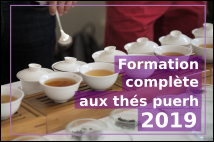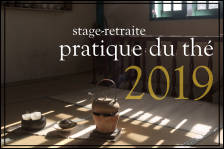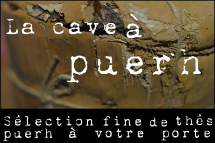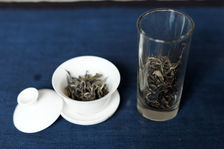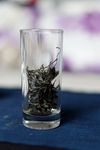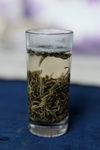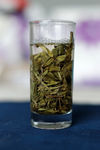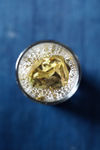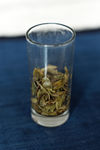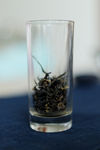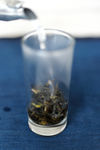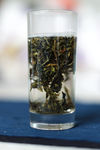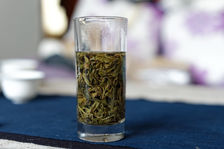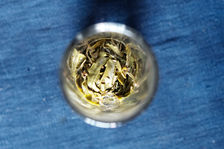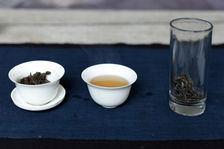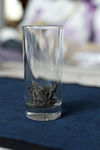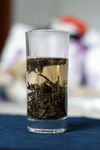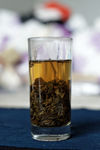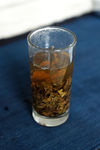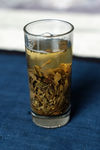 This page is not a real translation but just an automatic translation generated by computer of the original article, written in French language! Its not good... but better than nothing!
This page is not a real translation but just an automatic translation generated by computer of the original article, written in French language! Its not good... but better than nothing!Want to help us do diffuse puerh tea culture in english, by providing a better (or corrected) translation?
Please contact us!

For many tea lovers, Gung Fu Cha , or simply rapid and successive infusion of tea leaves with a small teapot or a gaiwan are rigor. This is indeed the way the puerh (Pu Er tea) tea is generally advisable to infuse quality teas, including this method in fact get the best sheets and appreciate the dynamism As infusions.
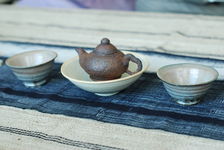

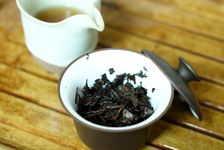

- 1.Infusion type Gung Fu Cha with a teapot
- 3.Infusion type Gung Fu Cha with Gaiwan and a pitcher
- 4.Small cup Tasting
Many are so surprised when discovering that it is actually quite rare in Yunnan meet someone making tea this way outside the capital, specialty shops, or a very small community of intellectuals .
Virtually everyone in Yunnan drink tea all day long, in the street, in parks, train stations, trains, at work, from the towers of concrete capital jusqy'au the bottom of gardens tea mountains of Lincang or Xishuangbanna. The restaurant either in town or in the countryside are not free water but tea to accompany the meal, we always offer tea to customers whether to negotiate an important contract or just go to the hairdresser and there are free hot water dispensers in the train stations and the airport allowing easy wants to infuse his own tea when he wants!


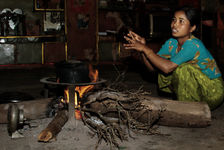
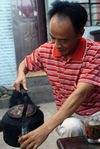
- 1.Bus driver filling his cup of tea in the mountains of Yunnan
- 2.Heat water to affine to welcome the visitor tea
- 3.Heat water for tea affine to welcome visitors
- 4.Tea to welcome the visitor
Tea also in Yunnan an important social role in the country, they generally welcome the guest or passing with tea. When someone enters the house the first thing we do is to invite him to sit down and, whatever the time of day, to offer him a cup of tea. There's so in general it is always a big thermos of boiling water ready, or otherwise we will be eager to put a log on the fire to heat a large kettle.
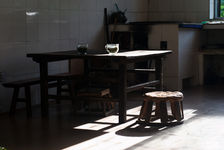
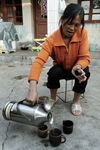
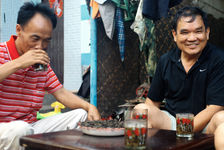
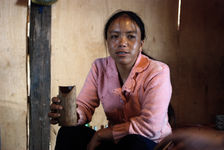
- 1.Tea in a glass of water on a farm in Yi Wu
- 2.Making tea in a glass of water in the countryside of Lincang
- 3.Drinking tea in a glass of water two producers Jinuo Shan
- 4.infususé Tea in a glass bamboo on a farm in Lao Banzhang
But Yunnan is primarily a local region, a mountainous and mostly agricultural land, where we usually approach things very down to earth. So if you care about the quality of tea, ie tea leaves, it is not often done so when the way that it is infused, and is generally happy to do is throw a handful leaves in a simple glass of water or a large cup-shaped mug. After quickly rinsing the tea by throwing the first infusion, water is again fill the glass to let the leaves unfold and infuse a few minutes, then without removing the leaves are infused drink, filtering or more less sheets with his lips or teeth if necessary.
One day we were around one of these glass of tea, a producer friend puerh (Pu Er tea) Yi Wu mocked about it the way intellectuals in the capital, saying that here is the Gung Fu said that this amounted to feed an elephant with a spoon. And for some carefully tasted their tea (cha 品茶 pine) in small china cups, tea here on wood (喝茶 he cha, cha chi 吃茶 see in rural areas) in large glass of water.
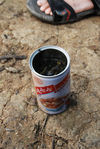
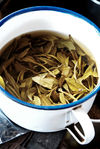
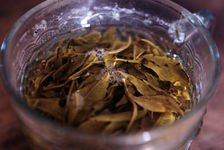
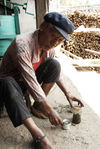
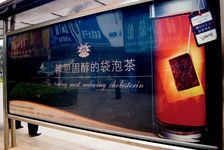
- 1.Tea brewed in an old tin in a tea garden Yi Wu
- 2.Tea brewed in a metal coffee Nanuo Shan
- 3.Tea leaves in a glass of water Yi Wu
- 4.Peasants infusing his tea in Yunnan
- 5.Advertising for a compressed puerh (Pu Er tea) tea bags in the city of Pu Er
If we can see more and more in recent years appear tea tables and kits Gung Fu among small producers terroirs as Yunnan Yi Wu, Banzhang or Bing Dao is a very recent phenomenon, and producers are more or less developed Gung Fu for the more serious air to some visitors and buyers come to big cities, but as soon as these visitors are not looking is invariably the glass of water again.
The glass of water not only to drink tea while eating or working, but the glass of water to taste and choose tea. Because in rural Yunnan is also with a simple glass of water as a tea tasting, and we judge its quality, which is lacking in general not to confuse the Western professional visit villages producer. Used to judge a tea in a calm and neutral atmosphere with its small paraphernalia Gung Fu Cha precision, this one is suddenly between chickens and pigs have to get an idea of one of the finest teas from Yunnan with in hand a large glass of water in which a dozen grams of leaves float from a few good minutes in the midst of a more or less water boiling ...
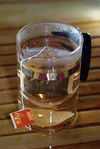
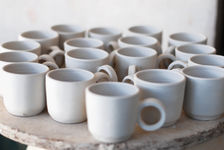
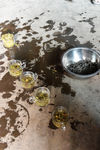
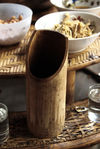
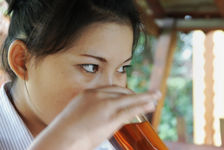
- 1.Bag of puerh (Pu Er tea) tea brewed in a glass mug
- 2.Mugs land turned into a village of Lincang
- 3.Taste and compare puerh (Pu Er tea) teas with glasses of water
- 4.Wholesale traditional glass Jinuo Bamboo
- 5.Drink the puerh (Pu Er tea) tea in a glass of water
Rendering such an infusion is of course quite different if these sheets were expressed through an infusion Gaiwan a few seconds. The intensity and density are increased tenfold in particular, but also often see the bitter astringency that has something taped one who has never had a raw puerh (Pu Er tea) that through retaining a moderate Gung Fu Cha.
Yunnan is indeed an area where taste playing with physics, where a dish can often contain 20% to 50% of strong chili, where they eat fruits such as peach and apricot walls but not green and hard, usually crushed with salt and pepper, and where the olives are eaten just picked from the tree. The bitter, sour, spicy or astringency are thus not in Yunnan simple enhancer that would be used sparingly to meet discreetly taste, but the taste between areas in which frank and which therefore have their own taste values. And it is in this context that in rural Yunnan tea fits.
Pass the course of the assault, and he has a genuine interest in rediscovering its puerh (Pu Er tea) brewed this way, especially in the ability it gives them to overcome the taste sensation to touch, but also the wealth of sensations back this product. As is the case of a good brandy or a good strong coffee, a simple gorged enough to emerge a multitude of feeling for a handful of minutes and it's all these sensations in the back immediate sensation that is so all's sake tasting.
Although the rendering of such a mode of infusion will be quite different from a puerh (Pu Er tea) to another, not necessarily bitter or aggressive with saplings from wild trees or particularly soft puerh, much sharper with old trees older puerh, undrinkable with bad puerh, etc ... Of course it is still anything else with fermented puerh, where the flavors develop swell without bitterness or aggression, which the liquor reaches a thickness and density can approach those of coffee.
By encouraging you to rediscover your favorite drink as you would in the Yunnanese countryside where they were produced puerh, here are some examples of different kinds of puerh (Pu Er tea) brewed this way, and how they express themselves well.
Young raw puerh (Pu Er tea) from Wu Yi, Wang Bing Ecological Garden 2013
Start with a maocha Yi Wu last spring green trees from a few decades. This is the maocha used to make patties Shen Tai white packaging featured in the recent article on Wang Bing vintages 2013 .
Infused traditional Gung Fu is a typed puerh (Pu Er tea) Yi Wu shines by its roundness, its intensity and sweetness. The relatively young age of the trees, but also maintains the excellent and ecological nature of the garden, this tea provides a great sweetness and bitterness almost nonexistent, while having a good aromatic density. He was reproached by easily against a lack of depth and subtlety face a tea of the same quality but from older trees.
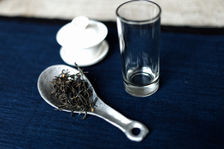
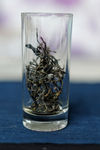
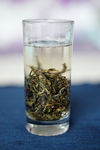
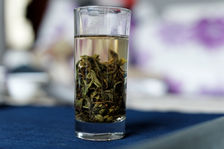
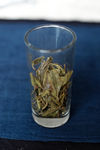
- 1.Shen Tai Cha brewed glass of water
- 4.Shen Tai Cha infused glass of water
- 5.Shen Tai Cha brewed glass of water
Infused length in a glass of boiling water, we find first of all at once round and warm character of this tea, which totally takes over the floral or aromatic finesse spring. We are dealing with something more sleek, simple, a return to the essence of this tea. This is a tea that due to its reduced bitterness is doing well in this type of infusion and drink alone. With time and as and when the leaves infuse develops a moderate bitterness and a vegetable dimension references to the vigor of the plant. It contains buttons that remind some purple tea:herbs, cloves, juniper.
Unsurprisingly infusion glass of water significantly lengthening the duration of sensation back, and puts the focus on between cups and breathing. Although very mild bitterness that grows with the taste still carves beautiful sweet echoes that come in the color space between sips. After several re-infusion, tea clearly softens, while highlighting the plant part of the plant, more difficult to see in a short infusion Gaiwan.
Young puerh (Pu Er tea) raw Yi Wu, maocha from Gao Shan old trees 2013
Infuse now using the same method a maocha the same region, harvested at the same time, but from much older trees village of Gao Shan, presented in this article on maocha Spring 3 villages of Yi Wu .
Gaiwan infused, this tea is conspicuous by its balance, subtlety and delicacy and freshness and spicy complexity of its flavors. We appreciate the great depth of this tea, its dynamism and its ability to speak with wealth between the cups.
Infused glass of water one is first impressed by the intensity of the tea and the density of the liquid that becomes a concentrated flavor. Each tiny sip is the effect of a fruity explosion, captured the mouth, throat, sweeping in and huddled in the nose.
Despite what you might think this tea retains its richness infused glass of water. The focus is now more focused on the sensations in the mouth, the roundness, the body and fruitiness of this tea, here or infusion gung fu favors vaporous and spicy richness.
The bitterness while well this is very significant on a few minutes of infusion and is perfectly balanced with rich aroma and fruitiness that this tea has. If the infusion is pushed beyond the typical astringency of old trees begins to attack the taste buds while remaining still in reasonable order.
This couple bitterness /astrigence however carves wonderfully beautiful rear sensations, accompanied by the softening of the infusion, produce beautiful sensations of softness after the 2nd or 3rd glass:First tea loses objectively bitterness secondly the palace prepared by the first infusion highlights the sweetness and fruity tea, whose sweetness is a remarkable richness and complexity. Just after a few glasses of this tea to drink a sip or two of hot water, to feel how the palace was worked by tea.
In spring a rich aroma and a high quality of sensations, which have nothing to envy infusion Gung Fu. If it loses subtlety, and does not allow as a gung infusion to distinguish with much finesse different sensory layers that make the character of the tea, a tea glass of water concentrates the aromas and swells, and plays with sense in a way and a force which a short infusion can access. This is particularly noticeable at the rear feelings who find themselves stretched and amplified, but also the generation of complex echoes sweets. Similarly, the persistence of flavors is remarkable and account either in seconds but in minutes.
Of course it should be reasonable on the duration of infusions, especially while the glass is empty and the liquor is concentrated. Being a true Gu Shu Cha old trees, too concentrated infusions naturally reach a high level of bitterness and astringency and will be seen as aggressive, especially by non warns palace. Do not hesitate to re-fill your glass As it empty if you start to feel assaulted by the strength of the tea, or you go to aerate and walk out, then you will most probably surprised by power and wealth back sensations.
Young maocha wild tea trees, Sai Hu Da 2013
Now experiencing infusion glass of water with a puerh (Pu Er tea) of a different nature as from wild trees Sai Da Hu, a your local Mengku the highest at the edge of Da Xue Shan. This is a tea that has the typical character of young puerh (Pu Er tea) wild, fresh and sharp théiera with citrus characteristics keys.
Infused Gaiwan we appreciate this tea its fluidity, its roundness, the silky softness and aromatic richness. If he does not have the depth or complexity of a good Gu Shu Cha, this tea has against by a singular and interesting aromatic character, including fruit and citrus dimension keys that characterizes it.
Long brewed in a glass of boiling water, tea retains precisely the same character, with tenfold density and excellent thickness of the liquor. The lack of a great aromatic complexity, and low bitterness of the tea makes tea especially suitable for infusion glass of water. The flavors are rich but relatively simple indeed not denatured by this type of infusion, but instead found densified inflated.
The citrus sweetness then take a dimension to any remarkable as the palace in their wispy echoes. Persistence also particularly long, tinting the breath of a floral bouquet sprinkled with touches of citrus zest, and for several minutes even after the last sip.
Over very long infusions include the structure of this tea, bitterness and astringency, which, masked by the strong fruity and lemony flavors dominant, virtually unnoticed in an infusion Gung Fu Cha. The slight bitterness help generate echoes good sweet and complex on the palate and nose.
After a few drinks infusions become a smooth and bright unusual, again due to the dual effect of softening tea and work caused by the first infusions palace. We are then in a concentrated dried fruit relieved by net lemony freshness, in a very different wealth but at least as interesting as what it offers tea infusion conventional Gung Fu.
Mengku Gu Hua Cha 2006
Always armed with our glass of water move to another universe, a slab of raw puerh (Pu Er tea) produced by Mengku Rong Shi in 2006. Worked particularly well with the maturation is a complex and powerful tea that is easy to give 5-7 more years.
Infused traditional Gung Fu Cha is a tea rich that we particularly appreciate for its mature size. It includes all the quality of a good natural maturation in a dry atmosphere, subtle camphor keys and a beautiful richness between dry fruit, fresh bamboo and old wood. In the mouth it is a particularly dense tea, with a thick liquor, good structure, a very present bitterness and hot keys between aromatic wood and caramel. This tea is also remarkable for its persistence and richness of sensations that develops echoes throughout the tasting.
Infused glass of water this tea is a remarkable intensity and density. We find the character of this tea as it appears in Gaiwan, but with much more force. If fruity and woody dimension is present, the clear increase in bitterness put this one in the background, making it much more masculine edge and tea.
Coupled with the rich aroma of this tea, however, this bitterness has an excellent propensity to develop aromas echo and gives the tea a unique persistence. Each drop of tea and wake aromas of great strength, develops in the nasal cavity powerful perfumes, and shows in the mouth treats particularly sharp and bright present, rich and intense.
However, this appears as a particularly potent brew tea with unconcealed violence, the tasting will be without a doubt taken as an attack by an unaccustomed palate. However, in going beyond one appreciates the great propensity of this tea and brewed to bring out one taste, and such an explosion, all taste remarkably rich universe, and to maintain this aromatic landscape on an amazing time ... Result is a beverage product that let enjoy drip, the length, and we will continue to explore for an hour after the last drop!
fermented Puerh large leaves, Chang Yun, 2006
Finally to end this exploration of the potential of a simple glass of water, we will radically change world with greener but not fermented puerh. It is a fermented puerh (Pu Er tea) bulk, produced in 2006 by Chang Yun from older leaves, ie high grade.
It is a fine and subtle fermented puerh (Pu Er tea) with particularly pure and clear flavors. Short infusions Gung Fu Cha reveal a rich aroma and a universe very bright, clean, woody and fruity. This is a contemporary fermented puerh, playing in brightness, roundness and light.
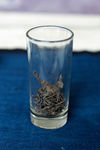
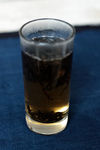
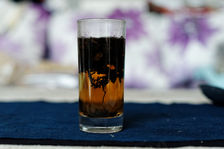
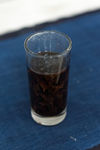
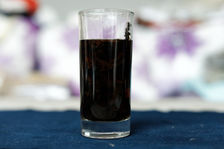
- 1.Shu Cha infusion glass of water
- 2. Shu Cha infusion glass of water
- 4. Shu Cha infusion glass of water
- 5.Shu Cha infusion glass of water
Infused elongation in a glass of water, tea is denser to the extreme, producing an elixir of sweetness and a fabulous concentration. It is the opposite of fluidity and the light produced by short infusions, to enter an on-aromatic concentration. Every drop invades the senses starting with the mouth finds herself pleasantly saturated as roundness and throat that seems to cover a highly aromatic honeyed layer, and finally the nasal cavity in which each breath becomes an intense fragrance .
It is typically in the character of good fermented puerh (Pu Er tea) brewed tight, something that is not in the lightness and fluidity, but without the slightest aggression, in a concentrated intensity. A tea brewed and not drink more, but the taste is comparable in taste and for which care must be taken to allow each drop the place and time to express themselves.
Unlike other teas tasted before, this tea fermented by its nature is not gaining sharp, but instead seems to be well-rounded lover to tighter that allows water molecules. If it drags on the infusion reached density saturate the senses, making it almost hard to drink tea with the sensation of drinking a concentrated licorice. Such a tasting with one spring for a good time that tickles the throat and seems to be covered with a particularly aromatic honey ...

